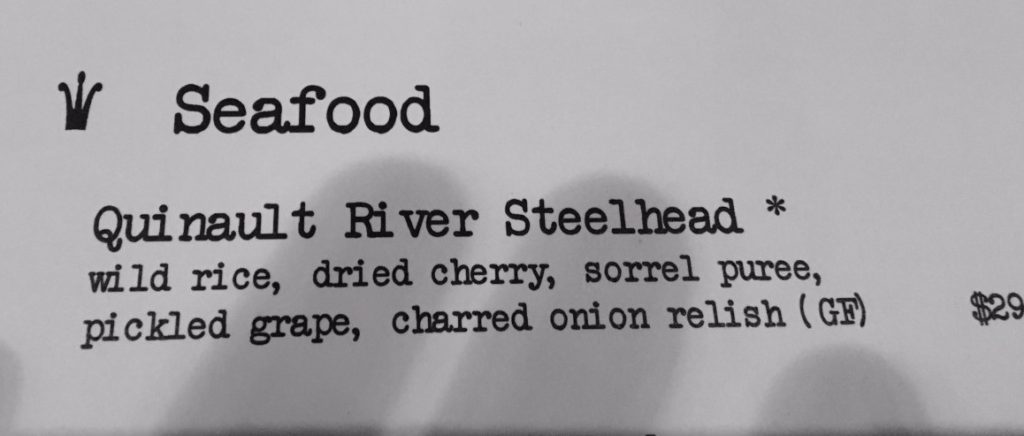
Seafood Watch claims wild steelhead harvested from the Olympic Peninsula are a “Good Alternative”. The data says otherwise.
Renowned for their long migrations and tenacious nature, wild steelhead are ingrained with a resilience that enables them to survive the litany of obstacles mankind throws in their path. But their resilience has its limits and some obstacles prove to be insurmountable.
Recently, Monterey Bay Aquarium’s Seafood Watch – a guide for helping consumers make sustainable fish choices – threw such an obstacle in the path of Washington’s State Fish when they designated steelhead harvested from the state’s coast rivers through nonselective gillnets as a sustainable fish choice, labeling it a “Good Alternative.” This designation could be the nail in the coffin for sharply declining returns of wild steelhead in famed Olympic Peninsula rivers like the Hoh, Queets, and Bogachiel.
According to data from the Washington Department of Fish and Wildlife, wild steelhead populations returning to Olympic Peninsula rivers experienced as much as a 50 percent decline since 1980. Iconic rivers such as the Quillayute and Bogachiel experienced some of the lowest returns on record in 2016.
Returns on the Hoh River last year were similarly disappointing. The number of wild winter steelhead that made it to the spawning grounds did not reach the river’s escapement goal yet again. Over the last fifteen years, Hoh River wild winter steelhead have met escapement targets less than 50 percent of the time. In total, fewer than 3,000 wild steelhead returned to the Hoh in 2016 – only the second time that their numbers have fallen so low.
Today, many worry that wild steelhead populations across Washington’s coastal rivers are on the verge of being listed under the Endangered Species Act.
“Seafood Watch’s outrageous designation flies in the face of both science and sentiment,” said Rich Simms, founder and board member of the Wild Steelhead Coalition. “It means that increasingly threatened populations of wild steelhead can be sold nationwide in stores like Whole Foods Market as a sustainable food choice. This label encourages unsuspecting consumers to purchase a species spiraling towards an endangered listing.”
“The Conservation Angler is stunned by Seafood Watch decision to list tribally harvested wild steelhead from the Quillayute, Hoh, Queets, Quinault and Humptulips as a “Good” seafood choice alternative. These tribal fisheries are not sustainable and do not come close to meeting Seafood Watch’s own standards and criteria in evaluating fisheries,” said Pete Soverel, President of The Conservation Angler.
In 2015, sport fishermen willingly sacrificed their wild steelhead harvest rights and adopted less impactful fishing practices through regulation changes on the Olympic Peninsula because these runs are on the brink of collapse. Meanwhile, many Native American tribes commercially harvesting wild steelhead with gillnets refuse to implement stricter harvest plans, catch monitoring guidelines, or more responsible fishing practices for these threatened wild fish.
While the Wild Steelhead Coalition and The Conservation Angler appreciate the hard work and leadership of tribal nations on habitat restoration projects and other efforts, they believe the wild steelhead fisheries referenced in Seafood Watch’s designation are far from a “Good Alternative”.
“We respect tribal treaty rights to responsibly harvest salmon and steelhead when abundance allows,” said Simms. “However, the long-term decline of wild runs, their current dire state, and the use of non-selective methods such as gillnets make it grossly inappropriate for these wild steelhead fisheries to be labeled as sustainable.”
Evidence in the Seafood Watch report, released in February 2017, shows that the organization likely used an inappropriate assessment standard developed for marine fish and fisheries, as opposed to in-river fisheries like those for wild steelhead, and likely failed to account for undisputed data establishing the substantial, long-term decline of OP wild steelhead since 1980.
The Wild Steelhead Coalition and The Conservation Angler are encouraging steelhead anglers and conservationists across the nation to contact Monterey Bay Aquarium and Seafood Watch to withdraw this misguided designation.
Founded in Washington in 2000 and representing thousands of fish conservationists, the Wild Steelhead Coalition is dedicated to increasing the return of wild steelhead to the waters of the West Coast.
The Conservation Angler is a non-profit group that advocates for wild fish and fisheries and works to protect and conserve wild steelhead, salmon, trout, and char throughout their Pacific range. The Conservation Angler is a watch-dog organization – holding public agencies, countries, and nations accountable for protecting and conserving wild fish.





